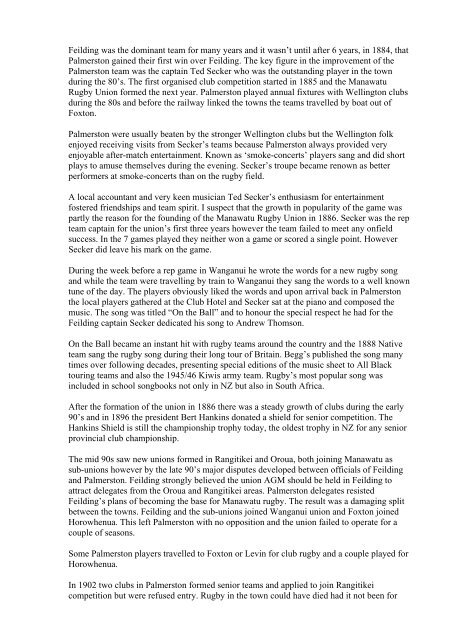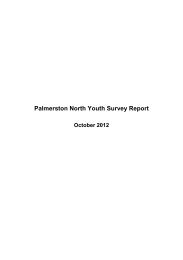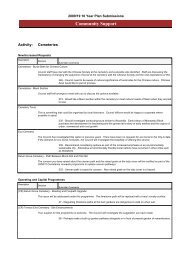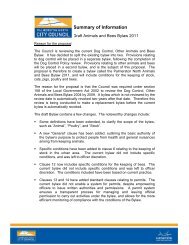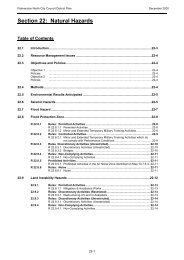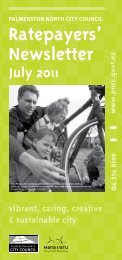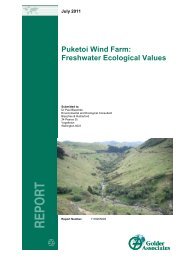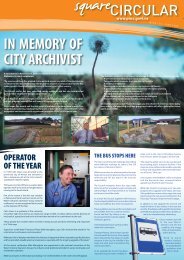Manawatu Journal of History - Digital Library
Manawatu Journal of History - Digital Library
Manawatu Journal of History - Digital Library
You also want an ePaper? Increase the reach of your titles
YUMPU automatically turns print PDFs into web optimized ePapers that Google loves.
Feilding was the dominant team for many years and it wasn’t until after 6 years, in 1884, thatPalmerston gained their first win over Feilding. The key figure in the improvement <strong>of</strong> thePalmerston team was the captain Ted Secker who was the outstanding player in the townduring the 80’s. The first organised club competition started in 1885 and the <strong>Manawatu</strong>Rugby Union formed the next year. Palmerston played annual fixtures with Wellington clubsduring the 80s and before the railway linked the towns the teams travelled by boat out <strong>of</strong>Foxton.Palmerston were usually beaten by the stronger Wellington clubs but the Wellington folkenjoyed receiving visits from Secker’s teams because Palmerston always provided veryenjoyable after-match entertainment. Known as ‘smoke-concerts’ players sang and did shortplays to amuse themselves during the evening. Secker’s troupe became renown as betterperformers at smoke-concerts than on the rugby field.A local accountant and very keen musician Ted Secker’s enthusiasm for entertainmentfostered friendships and team spirit. I suspect that the growth in popularity <strong>of</strong> the game waspartly the reason for the founding <strong>of</strong> the <strong>Manawatu</strong> Rugby Union in 1886. Secker was the repteam captain for the union’s first three years however the team failed to meet any onfieldsuccess. In the 7 games played they neither won a game or scored a single point. HoweverSecker did leave his mark on the game.During the week before a rep game in Wanganui he wrote the words for a new rugby songand while the team were travelling by train to Wanganui they sang the words to a well knowntune <strong>of</strong> the day. The players obviously liked the words and upon arrival back in Palmerstonthe local players gathered at the Club Hotel and Secker sat at the piano and composed themusic. The song was titled “On the Ball” and to honour the special respect he had for theFeilding captain Secker dedicated his song to Andrew Thomson.On the Ball became an instant hit with rugby teams around the country and the 1888 Nativeteam sang the rugby song during their long tour <strong>of</strong> Britain. Begg’s published the song manytimes over following decades, presenting special editions <strong>of</strong> the music sheet to All Blacktouring teams and also the 1945/46 Kiwis army team. Rugby’s most popular song wasincluded in school songbooks not only in NZ but also in South Africa.After the formation <strong>of</strong> the union in 1886 there was a steady growth <strong>of</strong> clubs during the early90’s and in 1896 the president Bert Hankins donated a shield for senior competition. TheHankins Shield is still the championship trophy today, the oldest trophy in NZ for any seniorprovincial club championship.The mid 90s saw new unions formed in Rangitikei and Oroua, both joining <strong>Manawatu</strong> assub-unions however by the late 90’s major disputes developed between <strong>of</strong>ficials <strong>of</strong> Feildingand Palmerston. Feilding strongly believed the union AGM should be held in Feilding toattract delegates from the Oroua and Rangitikei areas. Palmerston delegates resistedFeilding’s plans <strong>of</strong> becoming the base for <strong>Manawatu</strong> rugby. The result was a damaging splitbetween the towns. Feilding and the sub-unions joined Wanganui union and Foxton joinedHorowhenua. This left Palmerston with no opposition and the union failed to operate for acouple <strong>of</strong> seasons.Some Palmerston players travelled to Foxton or Levin for club rugby and a couple played forHorowhenua.In 1902 two clubs in Palmerston formed senior teams and applied to join Rangitikeicompetition but were refused entry. Rugby in the town could have died had it not been for


